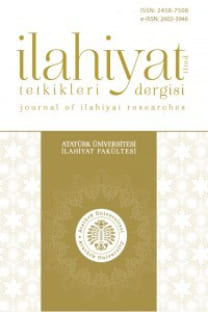W. C. Smith ve J. Hick’in Dini Çoğulculuk Hipotezlerinin Değerlendirilmesi
Bu çalışmada dışlayıcı ve kapsayıcı tutumlara karşı ortaya konulan dini çoğulculuğun temeliki figürü olan Wilfred Cantwell Smith ve John Hick’in dini çoğulculuk anlayışları incelenmektedir.Smith ve Hick’in, dinlerin aşkın her hangi bir müdahale olmadan meydana geldiğinde, dinihakikatin göreceli olduğu noktasında, kurtuluş meselesinde ve en önemlisi dışlayıcılık eleştirisitemelinde dini çoğulculuğun zorunluluğunun ileri sürüldüğü gerekçelerde mutabık olduklarıbirçok nokta bulunmaktadır. Bununla birlikte hipotezlerinin teolojik sonuçları başta olmak üzerebahsedilen hususlarda fikir ayrılığı yaşadıkları da görülmektedir. Bu sebeple iki düşünürünçoğulcu hipotezleri mukayeseli olarak değerlendirildikten sonra bu hipotezlere yönelik eleştirilerele alınmıştır. Temel problemimiz, bu iki düşünürce kurulan dini çoğulculuk hipotezlerininbaşarılı olup olmadığını ve söz konusu iki hipotez için ifade edilen konumu irdelemektir.
Anahtar Kelimeler:
Çoğulculuk, Dışlayıcılık, Din, Hakikat, Kapsayıcılık, Kurtuluş
Evaluation of the Hypothesis of W. C. Smith and J. Hick’s Religious Pluralism
In this study, Wilfred Cantwell Smith and John Hick’s understanding of religious pluralismhas been examined that they are the basic two figures of religious pluralism which is revealedagainst exclusionary and inclusionary approaches. There are a lot of points that Smith and Hickagreed such as religions were emerged without transcendental interventions, religious truth arerelative, the issue of salvation and the most important one, the necessity of religious pluralism atthe basis of criticism of exclusivism. However, it is seen that they have difference of opinion onsome issues in particular to theological results of their hypothesis. Therefore, criticism of thesehypothesis have been discussed after pluralistic hypothesis of two thinkers were evaluatedcomparatively. Our fundamental problem is to examine whether religious pluralism hypothesiscreated by these two thinkers are successful or not and the position stated for two hypothesis.
Keywords:
Pluralism, Exclusivism, Religion, Truth, Inclusivism, Salvation,
___
- W. C. Smith ve J. Hick’in Dini Çoğulculuk Hipotezlerinin Değerlendirilmesi
- ISSN: 2458-7508
- Yayın Aralığı: Yılda 2 Sayı
- Başlangıç: 1975
- Yayıncı: Atatürk Üniversitesi İlahiyat Fakültesi
Sayıdaki Diğer Makaleler
Usulu't-Tefsîr inde'r-Rağıb el-İsfehânî mine't-Ta'sîl ile't-Tef'îl
W. C. Smith ve J. Hick’in Dini Çoğulculuk Hipotezlerinin Değerlendirilmesi
Son Devir Osmanlı Âlimlerinden Ali Haydar Efendi’nin Hayatı, Hukukçuluğu ve Eserleri
İtikadî-İlmî Düalite ve Toplumsal Ahlâk
Makâsidu'l-usra f'l-Kur'âni'l-Kerîm
Filistin Edebiyatında Kimlik Sorunu / The Problem of İdentity in Palestinian Literature
